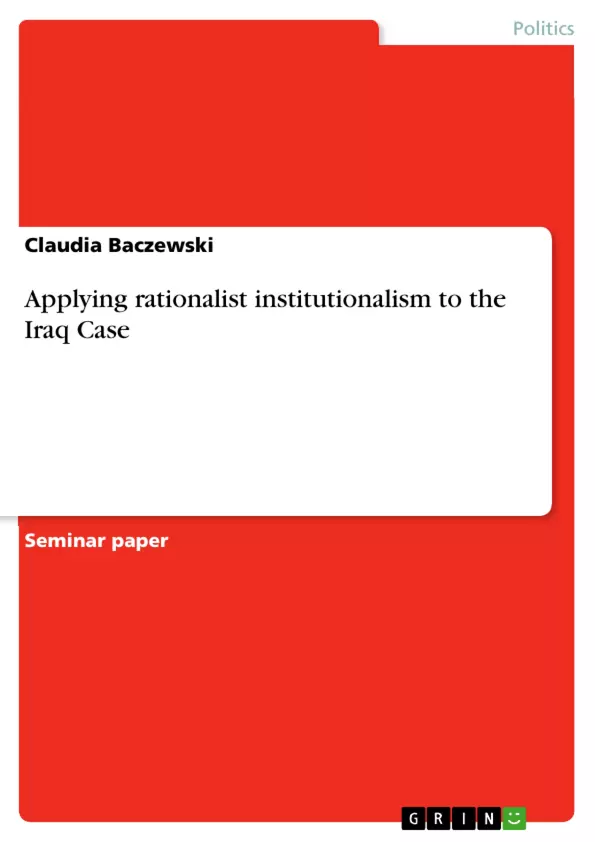„The basic problem facing anyone trying to understand contempory world politics is that there is so much material to look at that it is difficult to know which things matter and which do not. Where on earth would you start if you wanted to explain the most important political processes? Whenever individuals are faced with such a problem they have to resort to theories, whether they are aware of them or not. A theory is not simply some grand formal model with hypotheses and assumptions; rather a theory is some kind of simplifying device that allows us to decide which facts matter and which do not.“ (Baylis, Smith 1997: 3) The aim of this paper is to explain the outbreak of the Iraq War in 2003 with the help of a theory called Rationalist Institutionalism, which is one school of thought in International Relations.
Firstly, the paper will explain the Iraq Case more closer: what is the object of contention, which is the dependent variable, who are the relevant actors and finally how the course of conflict and the conflict management looked like before the war in 2003 broke out and during the war.
Secondly, the paper will introduce Rationalist Institutionalism as one school of thought of International Relations. The paper will look at relevant structures and actors in Rationalist Institutionalism and furthermore present main hypotheses and causal mechanisms followed by the relevant variables within this theory. Thirdly, and the most interesting part, this paper will apply Rationalist Institutionalism to the Iraq Case.
Finally the paper will discuss weaknesses and strengths of the theory as well as the question of what additional offers the theory can present in order to explain the war between the USA and Iraq in 2003.
Inhaltsverzeichnis (Table of Contents)
- I. Introduction
- II. Iraq Case
- Relevant Actors
- Object of Contention
- Dependent Variable
- III. Rationalist Institutionalism
- Structures and Actors in Rationalist Institutionalism
- Defining Institutions
- Dependent and Independent Variable in Rationalist Institutionalism
- Main Hypotheses and Causal Mechanisms
- IV Applying Rationalist Institutionalism to the Iraq Case
- USA
- Iraq
- V. Conclusion
Zielsetzung und Themenschwerpunkte (Objectives and Key Themes)
This paper aims to explain the outbreak of the Iraq War in 2003 using Rationalist Institutionalism, a theory within International Relations. The paper analyzes the conflict from the perspective of relevant actors, the object of contention, and the dependent variable. It then explores the theoretical framework of Rationalist Institutionalism, including its structures, actors, main hypotheses, and causal mechanisms. Finally, the paper applies Rationalist Institutionalism to the Iraq Case, highlighting the strengths and weaknesses of the theory in explaining the conflict.
- The outbreak of the Iraq War in 2003
- Rationalist Institutionalism as a theoretical framework
- The role of key actors, including the USA, Iraq, and the United Nations
- The object of contention, focusing on Iraq's possession of weapons of mass destruction (WMDs)
- The application of Rationalist Institutionalism to explain the Iraq War
Zusammenfassung der Kapitel (Chapter Summaries)
The introduction sets the stage by emphasizing the complexity of contemporary world politics and the importance of theories in understanding it. It establishes the paper's objective to explain the Iraq War through Rationalist Institutionalism.
Chapter II focuses on the Iraq Case, introducing the relevant actors, including the USA, Iraq, and the United Nations. It identifies the object of contention as Iraq's production and possession of WMDs, which serves as the primary reason for the USA's involvement in the war. It also analyzes the conflict's development and management, highlighting different conflict management types, including regulated versus unregulated, cooperative versus uncooperative, and violent versus peaceful conflict management.
Chapter III delves into Rationalist Institutionalism, explaining its core concepts and mechanisms. It discusses relevant structures and actors within the theory, outlining its main hypotheses and causal mechanisms. It also clarifies the dependent and independent variables within this theoretical framework.
Chapter IV applies Rationalist Institutionalism to the Iraq Case, examining the perspectives of the USA and Iraq. It explores how the theory explains the actions and motivations of both sides in the conflict.
Schlüsselwörter (Keywords)
The key terms and concepts in this paper include: Rationalist Institutionalism, Iraq War, weapons of mass destruction (WMDs), international relations, conflict management, relevant actors, object of contention, dependent variable, hypotheses, causal mechanisms, structures, and institutions.
Frequently Asked Questions
What is Rationalist Institutionalism?
It is a school of thought in International Relations that analyzes how international institutions influence the behavior of rational actors (states) to achieve cooperation or manage conflicts.
How does the theory explain the 2003 Iraq War?
The paper applies the theory to understand why international institutions failed to prevent the war, focusing on the motivations of the USA and Iraq regarding weapons of mass destruction (WMDs).
Who are the relevant actors in the Iraq Case?
The primary actors analyzed are the United States, the state of Iraq, and the United Nations as the central international institution.
What was the main object of contention?
The central issue was the suspected production and possession of weapons of mass destruction (WMDs) by Iraq, which the USA cited as the primary reason for intervention.
What are the strengths and weaknesses of Rationalist Institutionalism?
Strengths include its clear focus on rational interests and institutional rules. Weaknesses often involve its inability to account for non-rational factors like ideology or domestic political pressures.
Why is theory important in international politics?
As the abstract notes, theory acts as a "simplifying device" that helps analysts decide which facts matter among the vast amount of global information available.
- Quote paper
- Claudia Baczewski (Author), 2004, Applying rationalist institutionalism to the Iraq Case, Munich, GRIN Verlag, https://www.grin.com/document/63374



